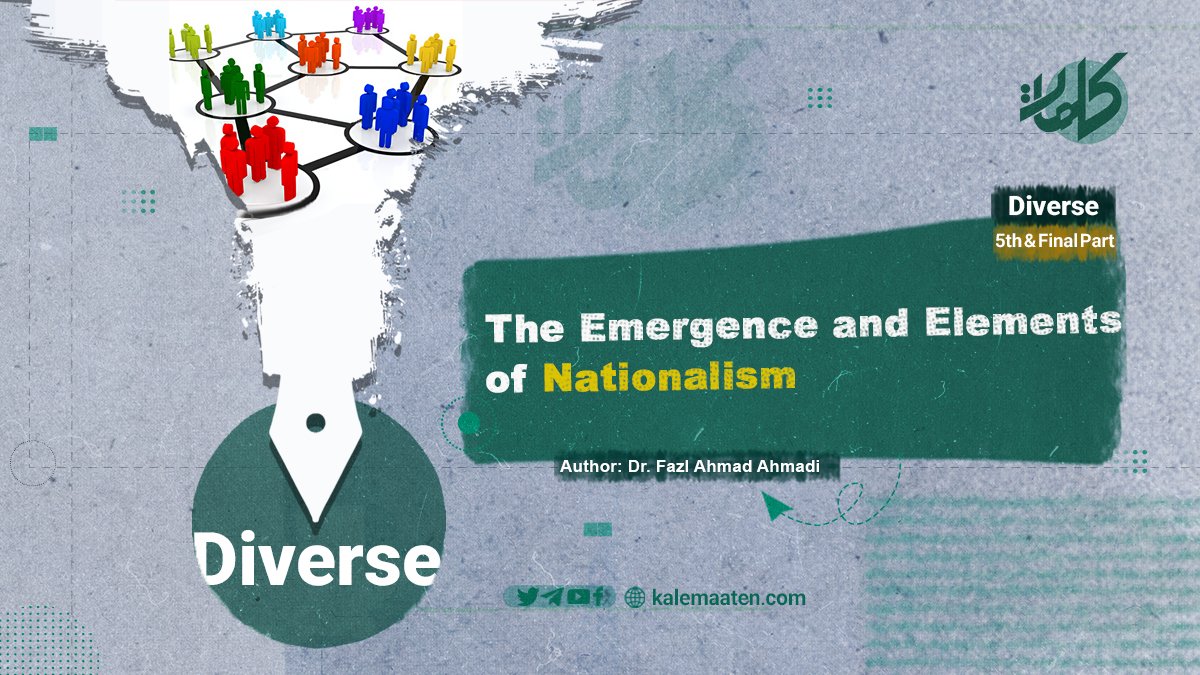Author: Dr. Fazl Ahmad Ahmadi
The Emergence and Elements of Nationalism (The 5th and Final Part)
Conclusion
Nationalism is one of the major political ideas that has experienced many ups and downs throughout history. The idea of nationalism represents a kind of collective consciousness; specifically, the consciousness belonging to a nation, which is referred to as national consciousness. National consciousness often creates a sense of loyalty, enthusiasm, and attachment among people to the elements that constitute the nation (such as race, language, tradition, habits, and social and cultural values). This can sometimes lead to exaggerated respect for these elements and a belief in their superiority over the manifestations of other nations, which may result in the humiliation of those other nations.
In Europe, nationalism emerged as a result of developments during the period of religious reforms and was strengthened by the Renaissance or intellectual movement. For many centuries, Europeans were influenced by pre-Christian cultural concepts and the teachings of Hellenism (Greek and ancient Roman civilization). However, with the rise of nationalism, they began to move away from the control of these concepts.
In Asia and Africa, the primary factors driving the growth and development of nationalism have been the desire for independence and anti-colonial sentiment, as most countries on these two continents were under the colonial rule of European powers for an extended period.
Simultaneously, nationalism in European countries has tended to be rational, optimistic, and pluralistic, while nationalism in Eastern countries has often exhibited a more emotional and authoritarian character.
References:
1. Girord, Delanty. (1388). Nationalism and Social Theory, translated, National Studies Quarterly, 40, Year 10, Number 4, Pages 190-200.
2. Salahi, Malek Yahya. (2019). Political Thoughts of the West in the 20th Century, 5th edition, Tehran, Iran: Qomes Publishing House.
3. Qaderi, Hatam. (2019). Political Ideas in the 20th Century, 12th edition, Tehran, Iran: Samt Publications.
4. Kaveh, Mahan. (2019). From Nationalism to Fascism.
5. Moradi, Kamran. (2017). From Identity to National Identity: An Introduction to the Theoretical Understanding of National Identity and Nationalism as a Discourse, Scientific-Promotion Quarterly of Society, Culture, and Media, Year 7, Number 29, Winter 2017, Pages 29-50.
6. Motheghi, Seyyed Ahmad. (2013). “Nationalism, Government, and Development,” Policy Quarterly, Year 1, Issue 3, Autumn 2014, Pages 21-33.
7. Mirmahmoudi, Toraj. (1400). “Nationalism among Muslim Nations and the West; and the Effect of Nationalism on the Unity of the Islamic World,” Social/Islamic Research Quarterly, Spring and Summer 1400, No. 123, Pages 312-338.
8. Nazari, Ali Ashraf. (2008). “Iranian Nationalism and Identity: A Case Study of the First Pahlavi Period,” Law and Politics Research Quarterly, Year 9, Number 22, Spring and Summer 2006, Pages 141-172.
9. Nik Ayin, Amir. (2008). Political and Social Dictionary, 2nd edition, Tehran, Iran: Tudeh Iran Publishing House.
10. Heywood, Andrew. (2011). Politics, translated by Abdurrahman Alam, 2nd edition, Nei Publishing House, Tehran, Iran.



